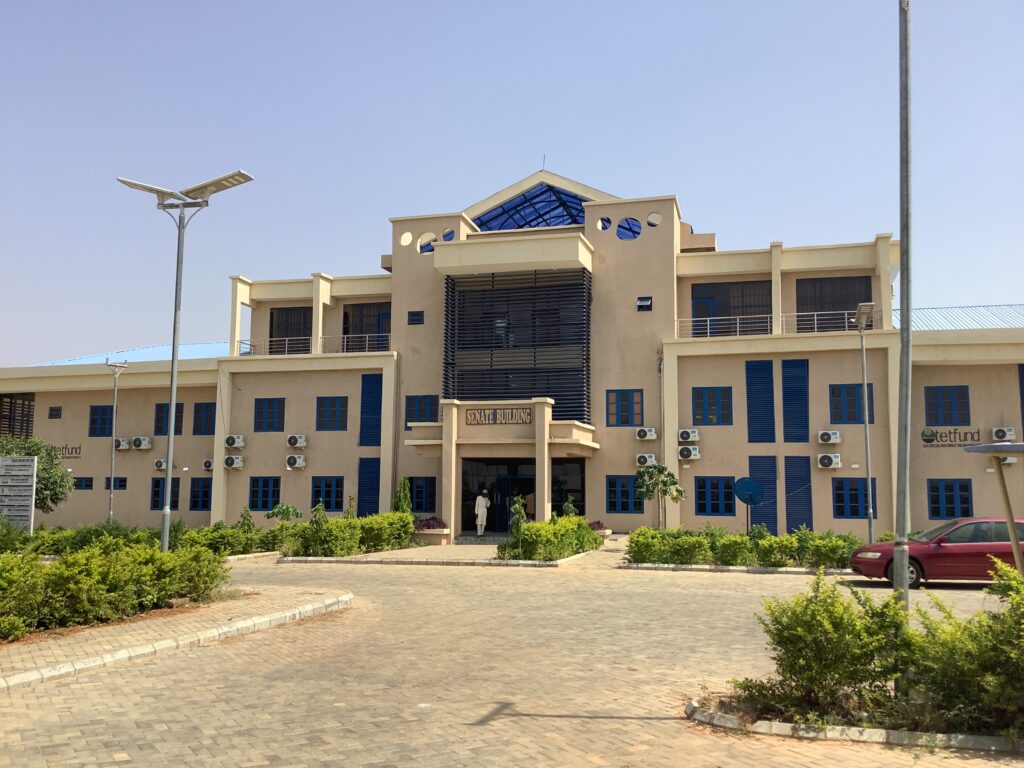The Department of Biochemistry and Molecular Biology strives to be
– a place where fundamental change is brought about in our students, ourselves, our
environment in a way we understand life at the molecular level.
– a department where staff members make a tangible impact on biochemical science education
on both under graduate and post graduate level because of their enjoyment of their work environment
and their love for their field of expertise.
Mission:
In line with the mission of the Federal University Birnin Kebbi and the rich interdisciplinary environment
that it provides, the Department of Biochemistry and Molecular Biology is committed in providing
aspiring molecular life scientists with the opportunity to obtain a world class education by engaging in a
program of instruction that emphasizes:
1. Fundamental chemical, biological, and physical principles
2. Rigorous and effective application of the scientific method.
3. Quantitative analysis.
4. Intensive experiential learning activities.
5. Critical thinking.
TEACHING GOALS AND OBJECTIVES
The department has the following as its goals and objective
i. To provide qualitative education in Biochemistry
ii. To provide a better living through biochemical research and community service.
iii. To increase the awareness of the role of Biochemistry in nutrition, health, industry,
biotechnology and other fields of human endeavor. Also to provide competent manpower to man these
areas.
iv. To promote environmental conservation through biochemical education and research.
v. To partake in the exploration and exploitation of our indigenous natural resources.
RESEARCH GOALS AND OBJECTIVES
The Department will be undertaking research in diverse fields of Biosciences namely, Pharmacological
Biochemistry, Toxicology, Medicinal Chemistry, Nutrition, Molecular Biology, Biotechnology, Medical as
well as Environmental Biochemistry. For the next ten years, the research focus of the department in on
the following areas.
i. To develop strategies and R&D for the reduction of malnutrition challenges in Nigeria and sub-Saharan Africa.
ii. To develop user-friendly diagnostics tool kits for the early detection of common human diseases in
Sub-Sahara African.
iii. To develop protocols for the early detection of plant diseases that are friendly to our laboratories
for sustainable crop production.
iv To collaborate with Pakistan University for snake venom research using Nigerian snakes in view
to produce cost-effective anti-snake venom.
V To establish a collaborative link with two universities in Europe, one in Asia, and one in Africa for
research and human resource sharing, in areas of Protein/Structural Biochemistry, NMR and Physical
Biochemistry
Programmes

- BSC Biochemistry
- PGD Biochemistry
- MSc Biochemistry
Admissions Requirements
Requirements
-
Olevel – ENG, MATH, CHE, PHY, BIO
UTME – Bio, PHY, CHEM
Requirements
-
Olevel – ENG, MATH, CHE, PHY, BIO
ALevel – OND/HND and NCE Biology/Chemistry
What you will study
- GST111 – Communication in English
- GST112 – Nigerian Peoples and Culture
- COS101 – Introduction to Computing Science
- BCH101 – Introductory Biochemistry I
- BCH102 – Introductory Biochemistry II
- BIO101 – General Biology I
- BIO102 – General Biology II
- BIO107 – General Biology Practical I
- BIO108 – General Biology Practical II
- CHM101 – General Chemistry I
- CHM102 – General Chemistry II
- CHM107 – General Chemistry Practical I
- CHM108 – General Chemistry Practical II
- MTH101 – Elementary Mathematics I
- MTH102 – Elementary Mathematics II
- PHY101 – General Physics I
- PHY102 – General Physics II
- PHY107 – General Physics Practical I
- PHY108 – General Physics Practical II
- GST203 – History and Philosophy of Science
- CHM211 – Organic Chemistry II
- BIO204 – Biological Techniques
- STA203 – Statistics for Agriculture and Biological sciences
- CHM212 – Inorganic Chemistry II
- CHM210 – Physical Chemistry II
- BCH203 – Introductory Molecular Biology
- GST202 – Logic Philosophy and Human Existence
- CHM213 – Analytical Chemistry I
- BCH204 – General Biochemistry Laboratory I
- BIO202 – Introductory Ecology
- GST201 – Communication in English II
- BCH202 – General Biochemistry II
- MCB201 – General Microbiology I
- BCH201 – General Biochemistry I
- BCH205 – General Biochemistry Laboratory II
- GST204 – Peace Studies and Conflict Resolution
- BIO201 – Genetics I
- CHM312 – Instrumental Methods of Analysis
- BCH304 – Metabolism of Amino Acids and Proteins
- BCH307 – Membrane Biochemistry
- BCH398 – Student Industrial Work Experience Scheme I (SIWES)
- BCH308 – Food and Nutritional Biochemistry
- BCH311 – General Biochemical Methods I
- BCH301 – Enzymology
- BCH302 – Metabolism of Carbohydrates
- MCB301 – Microbial Genetics and Molecular Biology
- BCH306 – Methods in Biochemistry
- BCH303 – Metabolism of Lipids
- BCH312 – General Biochemical Methods II
- BCH305 – Metabolism of Nucleic Acids and Porphyrins
- MCB311 – Microbial Physiology and Metabolism
- BCH313 – Biochemical Endocrinology
- GST301 – Entrepreneurship and Innovation
- BCH310 – Bioenergetics
- GST302 – Venture Creation and Growth
- CHM301 – Physical Chemistry III
- BCH309 – Molecular Biology
- CHM303 – Organic Chemistry III
- BCH413 – Immunochemistry
- BCH401 – Advanced Enzymology
- BCH415 – Environmental and Toxicological Biochemistry
- BCH499 – Research Project
- BCH402 – Biosynthesis of Macromolecules
- BCH414 – Comparative Biochemistry
- BCH403 – Tissue Biochemistry
- BCH410 – Industrial Biochemistry
- BCH417 – Basic Bioinformatics
- BCH407 – Plant Biochemistry
- BCH498 – Student Industrial Work Experience Scheme II (SIWES)
- BCH411 – Pharmacological Biochemistry
- BCH490 – Seminar
- BCH408 – Biochemical Reasoning
- BCH409 – Advanced Biochemical Methods (Practical)
- BCH412 – Clinical Biochemistry
- BCH406 – Metabolic Regulations
- BCH416 – Biochemistry of Parasites & Viruses
- BCH405 – Advanced Molecular Biology
- BCH404 – Bioinorganic Chemistry
- BCH409 – Advanced Biochemical Methods (Practical)
Research Interest
- Toxicology
- Nutrition
- Pharmacology
- Ethnobiochemistry,
- Environmental Biochemistry,
- Plant Biochemistry
- Molecular Biology

DEPARTMENT STAFF
- Prof. Aliyu Abdullahi Turaki

